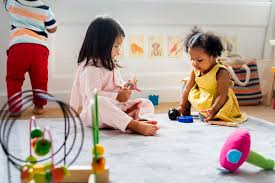Engaging children in a language they are comfortable with through playing is an efficient way to build their social skills. Play provides a platform for children to be articulate and build their vocabulary by using symbolic representation. Partnering with a children’s play therapist enables parents and caregivers to better understand how to support their child’s communication development. Play therapy has the following benefits for children:
Developing Coping Skills
A child may feel nervous when joining a new school or when they are meeting new people. A children’s play therapist provides a supportive figure, allowing your child to interact with others and learn how to address certain life challenges. Through imaginative play or building toys, your child learns to devise solutions to problems they face. This form of therapy encourages your child to apply creative reasoning in handling different situations, boosting their resilience.
Increasing Empathy
When your child engages in story narration, they gain insights into their emotional state and they get to learn how to respond with empathy. Stories provide a chance to explore social skills and communicate in a relatable way, improving social awareness. When children see their therapy figures express emotions, they learn to adopt and integrate those feelings. The process enhances their ability to be empathetic when dealing with peers, parents, and teachers.
Reducing Anxiety
Anxious feelings can be challenging to express among children with verbal communication limitations. When children engage in play, they get the right platform to demonstrate their anxieties indirectly through playacting. With the guidance of a professional, you get to understand what might be affecting your child or what caused the start of a behavior change. Playing allows your child to express worries through non-verbal actions, making them more manageable.
Building Self-discipline
In play therapy, children are given the freedom to interact and share their feelings without being judged. Activities such as role-playing prepare them to be responsible and accountable for their actions. Children often set small goals and work towards achieving them and if they successfully reach these targets, they boost their discipline in setting achievable objectives.
Strengthening Relationships
When children get involved in structured play activities such as board games, they learn about collaboration and bond creation. Therapy classes emphasize embracing supportive behaviors among children and working as a team when solving a problem. Play therapy helps reveal family dynamics and build understanding among family members.
The Role of a Children’s Play Therapist
Partnering with a trained therapist helps to increase the communication ability of your children through monitored play. These professionals devise fun games that are helpful in addressing the emotional needs of your children. A children’s play therapist does the following:
Advocates for the Child
In a school environment or settings such as community organizations, play therapists collaborate with social workers and other professionals to champion children’s fair care. They observe children under their care and propose the right approach to help them grow responsibly. Therapists advocate for a balanced timetable that sets enough time for children to play and engage in other activities.
Builds Trust With Children
Children may require trust to be established before opening up during play or when talking to people. Therapists understand how to handle different personalities of children through targeted games. They work to create an enabling environment for children to share their opinions through playful interactions. Therapists provide insights into the child’s emotional state during play sessions and advise parents on how to relate with their children.
Facilitates Play Therapy Sessions
Therapy sessions may be divided based on age groups, needs, and children’s availability to offer tailored support. Using different play techniques, therapists guide children through art activities and storytelling sessions. These activities are carefully planned to provide opportunities for your child to process their experiences and develop skills. Therapists work with clients to offer a solution to cases of anxiety among children and teach them to practice self-expression.
Partner With a Professional Therapist
If you’ve noticed a delay in your child’s development, angry outbursts, or you simply want to develop their social skills further, seek help from a therapist. Children’s play therapists understand that every child is unique and requires specific treatment solutions. Working with a therapist can also help you understand how to address certain behaviours your child may be exhibiting. Contact a play therapist to get more information on how they can help your child improve their communication skills today.






